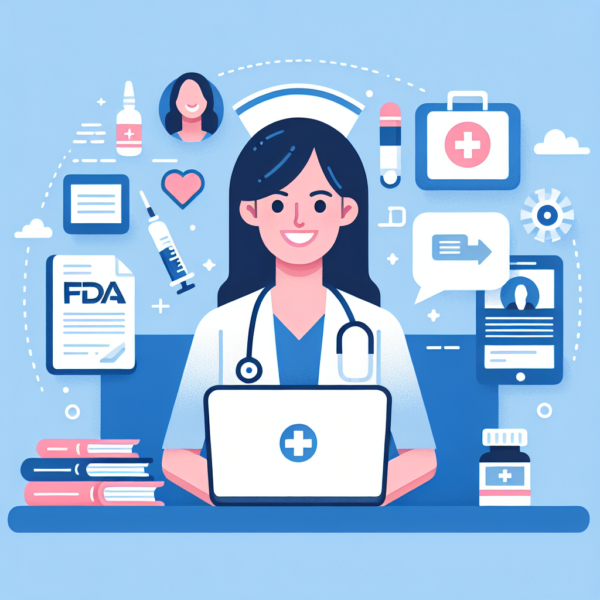FDA In A Nurse Job

The Critical Importance of FDA Knowledge in Nursing
The significance of FDA expertise in nursing cannot be overstated. This knowledge ensures that patient care aligns with the latest industry requirements, enhancing the quality of healthcare delivery. Furthermore, nurses with FDA proficiency may have greater job security and advancement prospects, as their skills are vital in navigating the complexities of modern healthcare regulations. Understanding FDA regulations is crucial for maintaining high standards of patient safety and care, which are the cornerstones of effective nursing practice.
Understanding the Context and Variations of FDA Skills in Nursing
FDA Skill in a Nurse job description manifests in diverse healthcare settings. Nurses working in clinical trials must understand FDA processes for new drug approvals, while those in hospital settings need to be well-versed in FDA recalls and safety communications. The skill is also crucial for nurses involved in policy-making or administrative roles focusing on compliance. At an entry-level, nurses begin familiarizing themselves with basic FDA guidelines as they apply to clinical settings. Mid-level nurses may take on additional responsibilities, such as participating in quality assurance programs that align with FDA standards. Senior nurses or nurse managers ensure institutional compliance with FDA requirements, possibly influencing policy at a higher level.
Real-World Applications of FDA Knowledge in Nursing
A notable example includes nurses at the frontline of the COVID-19 pandemic who quickly adapted to FDA emergency use authorizations (EUA) for vaccines and treatments, thereby playing a critical role in public health response efforts. One success story is the nurse who utilized their FDA knowledge to lead a hospital-wide initiative, significantly reducing medication errors and improving patient outcomes. Their expertise in FDA advisories and medication management protocols exemplified the importance of having strong FDA skills in nursing. These real-world applications highlight how FDA knowledge directly contributes to effective healthcare management and patient care.
Effectively Showcasing Your FDA Skills During Job Applications
Demonstrate your FDA proficiency during job interviews by discussing specific experiences where you applied FDA guidelines effectively. Create a portfolio that includes policies youve helped develop, committees youve been a part of, or any relevant training youve completed. For a more formal validation of your skills, consider earning a certification in healthcare compliance; this can bolster your resume and is available through organizations such as the Compliance Certification Board (www.hcca-info.org). Highlighting these experiences not only showcases your expertise but also demonstrates your commitment to maintaining high standards in healthcare.
Exploring Career Pathways and Opportunities with FDA Knowledge
Knowledge of FDA regulations can lead to career opportunities in nursing such as a clinical research nurse, a legal nurse consultant, or a nurse educator specializing in regulatory affairs. Combine your FDA knowledge with other skills like data analysis, leadership, and project management to further distinguish yourself in the job market and seek higher-level positions. These career pathways offer diverse opportunities for nurses to apply their FDA knowledge in various aspects of healthcare, ensuring compliance and enhancing patient care quality.
Gaining Insights from Industry Experts on FDA Regulations
Stay informed about regulatory updates by following FDA news releases and joining professional nursing associations, such as the American Nurses Association (www.nursingworld.org), which provides resources and training in regulatory compliance. Engaging with industry experts and resources helps nurses stay current with the latest FDA guidelines and best practices, ensuring they are well-prepared to handle any regulatory challenges in their professional roles.
Measuring Your Proficiency and Progress in FDA Regulations
To self-assess your proficiency, use checklists such as the FDAs self-audit guides and participate in online forums or webinars from sources like the National Institute of Health (www.nih.gov). These tools and resources help nurses evaluate their understanding and application of FDA regulations, ensuring they are always prepared to implement these guidelines effectively in their clinical practice.
Looking to build a resume that will help you compete in today’s tough job market? Jobalope’s resume tool will analyze your resume and any job description and tell you exactly how to take it to the next level.
Obtaining Certification and Endorsements in FDA Knowledge
To formally validate your knowledge, consider the Certified in Healthcare Compliance (CHC) credential, which is recognition of your understanding and ability to apply FDA regulatory guidelines in healthcare settings. This certification not only enhances your professional credibility but also demonstrates your dedication to upholding the highest standards of regulatory compliance in healthcare.
Maintaining and Continuously Updating Your FDA Skills
Regularly engage in continuing education programs, attend FDA workshops, and read industry publications to maintain your knowledge and stay abreast of the latest FDA-related information. Staying updated is crucial for nurses as it ensures they remain competent in managing the dynamic and often complex regulatory environment in healthcare.
Category and Job
Skills
- Acute care in a Nurse Job
- Case management in a Nurse Job
- CPR in a Nurse Job
- Documentation in a Nurse Job
- FDA in a Nurse Job
- Logistics in a Nurse Job
- Medical device in a Nurse Job
- On-call in a Nurse Job
- Ordering in a Nurse Job
- Patient care in a Nurse Job
- Policies in a Nurse Job
- Public health in a Nurse Job
- Public policy in a Nurse Job
- Safety in a Nurse Job
- Therapeutic care in a Nurse Job